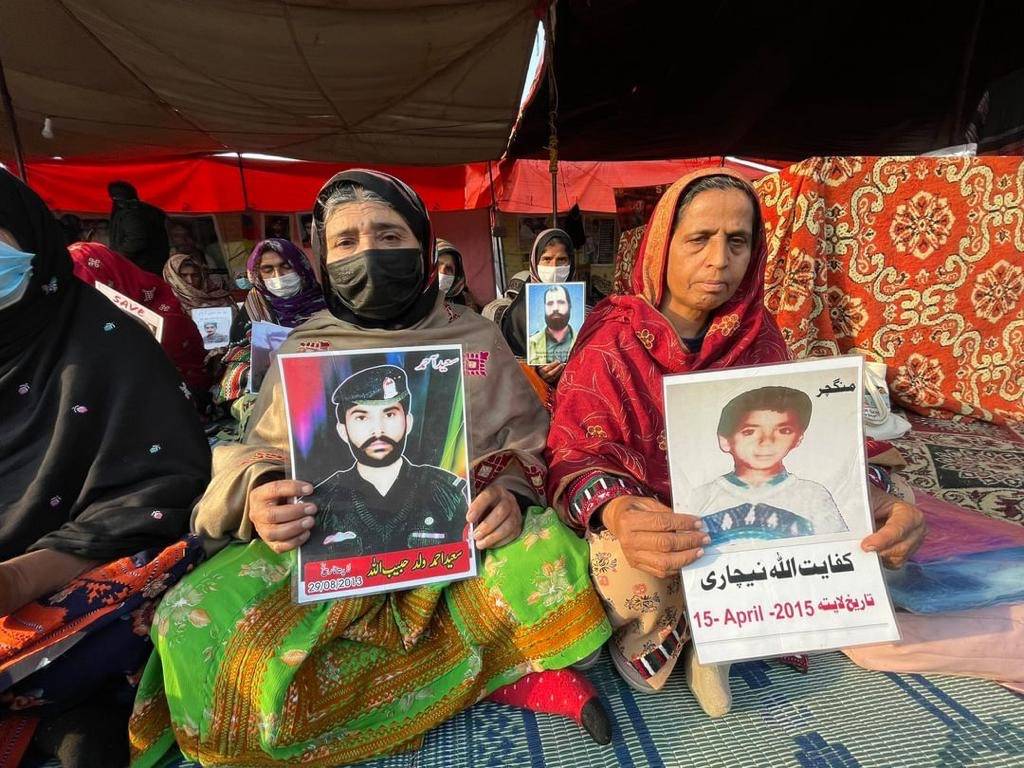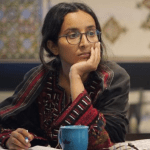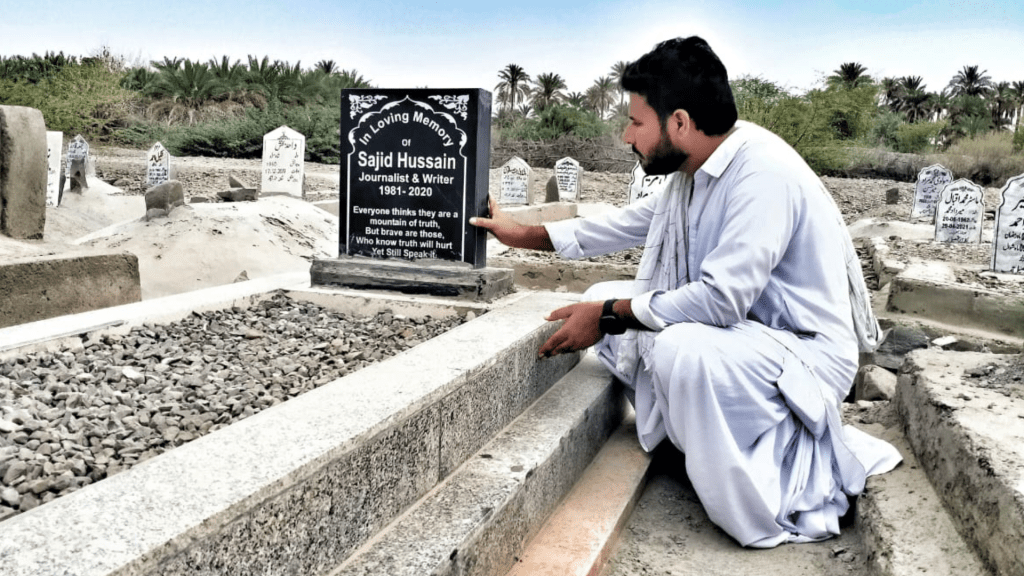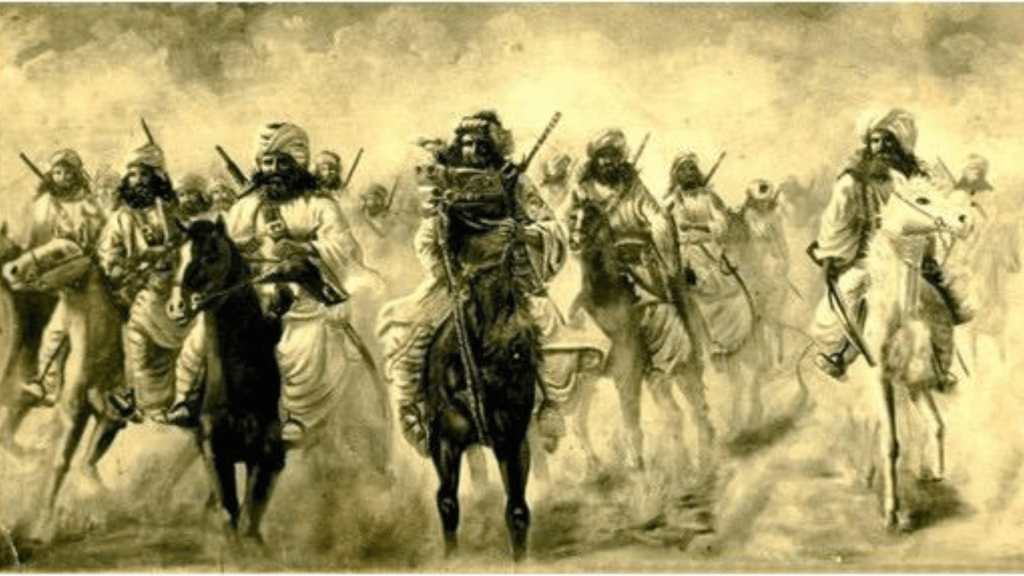I met Bibi Zargul for the first time at the Voice for Baloch Missing Persons’ camp in Quetta. We barely spoke for ten minutes as I interviewed her for a story I was working on. I had to rely on an interpreter to understand her because she spoke in Brahvi, but I needed no interpreter to understand the pain she was carrying – a pain I couldn’t relate to but one that thousands of people in Balochistan can. Holding her son’s picture, she wailed. This was during the first week of November.
I met her again in the last week of November in yet another protest camp, outside Islamabad’s National Press Club (NPC). At her age when she should have been resting at home, old Bibi had decided to once again knock at the door of justice – a door that has kept shutting on her for almost a decade now, but she still patiently stands outside and keeps knocking. I got to know there that for our Quetta meeting, she had traveled from Mastung in the hope that perhaps the interview she would give me would make a difference. As a journalist, I feel helpless when I think of how little is in my power, and how this mother must have narrated her pain to hundreds of journalists before me, hoping that it would help to take her son out of the dungeons.
Bibi’s son Saeed Ahmed was whisked away allegedly by security agencies on August 29, 2013, along with his cousin Hafiz Abdullah. The cousin was released after five years of illegal detention. Saeed’s whereabouts remain unknown.
When the Baloch long march from Turbat was scheduled to arrive at the NPC on December 20, 2023, I once again visited the camp where Bibi, along with some other families, had already spent more than three weeks protesting without any government officials genuinely hearing their pleas. She and others did meet the then-caretaker Interior Minister Sarfaraz Bugti, who told them that “(in some cases) these ‘missing’ persons had quarreled with their wives and fled to Karachi.” Saeed, though, is not married. He was engaged, but the engagement broke after a few months of his disappearance. One wonders who Saeed had quarreled with.
As I spoke with Bibi – who tried to have a conversation with me in Urdu this time, sometimes breaking in Brahvi mid-sentence – we were informed that the police had stopped the long march protesters at the Islamabad Toll Plaza, and the keys of the vehicles on which they traveled had been taken away. Later on, the peaceful marchers were told they couldn’t go to the NPC and should instead protest at a park.
What ensued after that is in front of the world to see. Protesters at the NPC blocked the road to demand the marchers be allowed to proceed. After a deadlock of hours, the Baloch Yakjehti Committee, the organizing group, decided to march towards D-Chowk. Policemen with batons and protective shields were present to stop them. Cameras were installed on police cars to monitor and surveil the protestors.
Around 12 AM the march proceeded. There is usually a deadly silence in Islamabad as midnight approaches. The city is infamous for sleeping early, but that night the chants of protesting Baloch students broke the silence and shook the city out of its slumber. The marchers were pumped up. “You can beat us as much as you want, we will see tonight who tires first,” one of them said to the police.
On one road marched the protestors, and the police strode across the other road. Eventually, the police caught up and placed barbed wires to deter the rally. The atmosphere charged up once again. In the throng was one of my classmates from university, a Pashtun. I still wonder where he got the courage to stand on the front line, light up a cigarette, and chant slogans at the top of his lungs. I vividly remember the angry, full-of-hate look that one policeman gave him.
A single attempt to cross the barbed wires, and the police unleashed their wrath – pushing and shoving, baton-charging, water cannons. As a journalist who had never been in such a situation before, I didn’t think of journalistic protocols but was simply amazed as a human being at the scenes that were unfolding in front of my eyes. My notebook got wet, my clothes got wet, and as I tried to go towards safety, I saw the police beating everyone with sticks. A protester tried to seek refuge with me, holding my shawl. I had never seen tear-gas or knew how it can make one feel. I didn’t even realize what the sparks on the ground were. Soon I was coughing, my eyes were teary, my face itchy. Along with a few other students, I entered an under-construction house, frantically pouring water on our faces and trying to make sense of the situation.
Back at the NPC camp, where Bibi and others were terrified to see the conditions of the students, the sit-in continued. As the night got colder fires were lit to keep warm. After a couple of hours when the police decided to crack down, the fires were put out, and the police came after the protesters with the same lit woods and sticks. More baton-charging. Everyone was pushed inside the camp, including the father of Balach Maula Bakhsh, the young man whose custodial killing by the Counter-Terrorism Department in Turbat had sparked the current protest movement.
At about 3 AM, everyone was put in a prison van, one after another. My university classmate, the Pashtun, told me afterwards that he was beaten black and blue while in custody. I didn’t have the time to argue with the police at that point that I was a journalist. I had to be a human first. Although soon afterwards in the prisoner’s van as well as inside the police station, I did inform them a few times that I was a journalist and was there to report and observe. Inside the prisoner’s van, I met Bibi once again. She held my hand. “You didn’t leave,” she said, and hugged me. Before the crackdown, I had bid her goodbye, not expecting the police were going to arrest us. I had hoped that by next day the marchers would arrive at the NPC where I would interview some of them.
I hadn’t experienced anything like this before in my life. More than 50 of us were put in a single room at the police station. When one protester asked under what crime were we arrested, one police officer replied, “We’ll just keep you here till the morning, you were out in the cold. Isn’t it warmer here?” Sure, it was warmer with barely enough space to sit as they kept bringing other female detainees who had been picked up from Tarnol. As Seema Baloch, Saira Baloch, and others were brought, they all had smiles on their faces. Everyone greeted and embraced one another. “You’re here too?” they chuckled. And I just sat there observing and wondering where those women got their courage from.
Inside the lock-up was one of the strangest people I had ever seen. A woman, about 30 years of age, that the police officers said had been there for two days and who was “mad” as per them. With her tangled hair, she kept screaming and shouting at the police officers as well as the detainees, hurling abuses. When everyone was locked in with her, she continued her abuse. Surprisingly, her senses seemed too sharp for someone mad, and she spoke almost impeccable English. Her hysteria terrified the kids in the lock-up. Even with her hands cuffed and legs tied up, she continued scaring the young girls and children and did not stop crawling towards them.
One of the protestors kept getting anxiety attacks, but the police refused to take her to the hospital despite several requests. Thrice everyone’s names, contact details, and identification numbers were asked.
Throughout the day the Baloch women asked the police a couple of simple questions: “What is our crime and why are we being detained?” But I realized those police officers had no authority. “We will release you when we have the orders from above.” “We do not have the permission to allow you a phone call.” “We are just doing our job. We have orders from above.” “We understand your pain, we just have orders from above to keep you detained for no crime.”
I was surprised at the number of officers who were interested to hear the entire story, who were unaware of the issue of enforced disappearances in Balochistan, and who would patiently hear the tales and ask more questions. I wondered if it was possible for them to not just blindly follow orders from above and for one day summon the courage to follow the law or listen to their conscience. Is that what it will take to bring about real change? The day when everyone in this country follows humanity rather than the illegal orders from above?
During our anxious hours in the jail cell, Bibi kept holding my hand. When I returned home around 7 PM after being released, I saw a picture of hers, unconscious in a bus, as the police tried to drag the Baloch women into buses to “deport” them back to Balochistan. Then, in another video, I saw the police pushing her. Yet, after all this, when I met her at the protest camp outside the NPC, after the Baloch women had bravely resisted and defeated the “orders from above” to send them back, Bibi greeted me with a warm hug and a smile on her face.
Bibi might not be fluent in Urdu, or read and write, but she, along with several other Baloch women, have made history with their resistance. There is no one stronger, more courageous and revolutionary than the mothers, sisters, and daughters who refuse to succumb to the brutality perpetuated on them and continue resisting. I wish Bibi could rest in the comfort of her home, as women her age do. I wish Bibi did not need to be so brave all the time. But, as Basharat Peer wrote in Curfewed Night, “Dirty wars seem to have a way of bringing mothers to city squares.” And in Pakistan these dirty wars keep bringing mothers like Bibi outside countless press clubs.
Somaiyah Hafeez is a freelance journalist. She tweets @sommulbaloch




